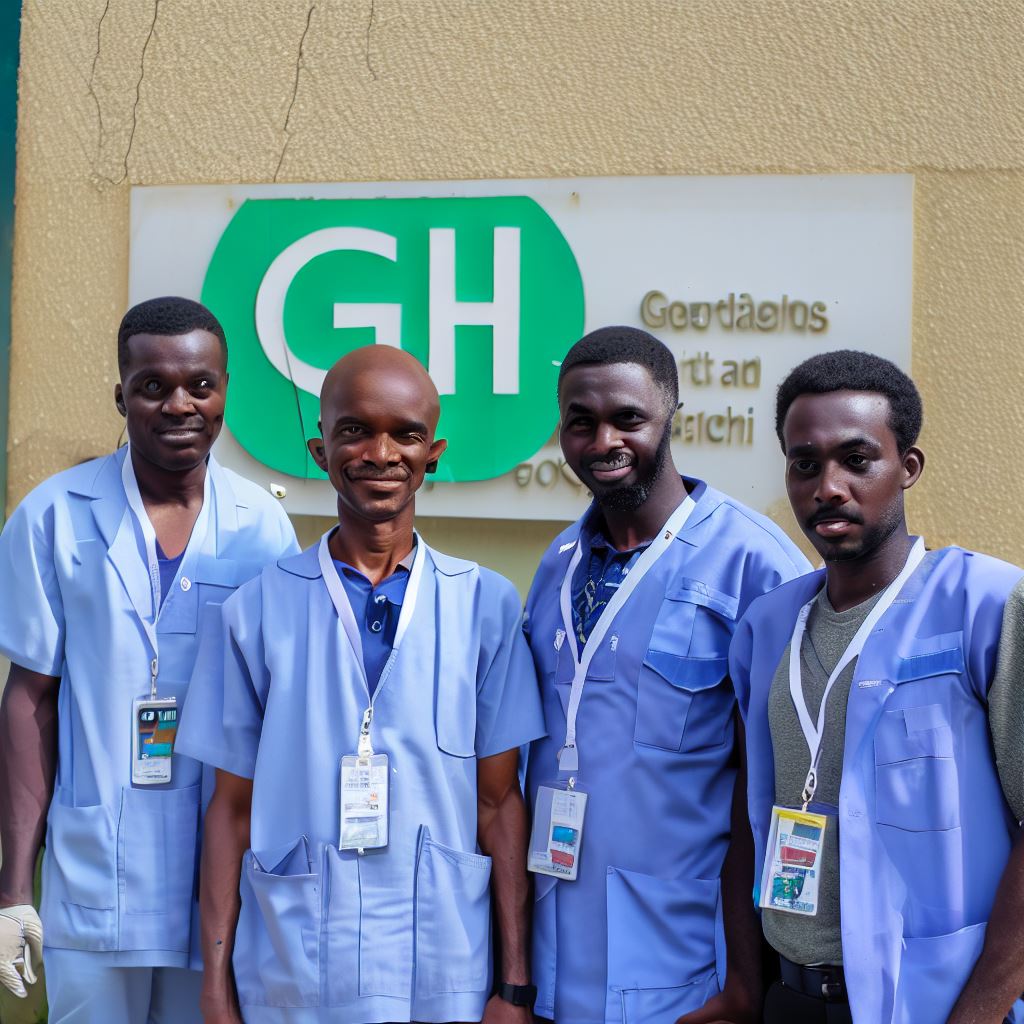Introduction
Epidemiologists are public health professionals who study patterns and causes of diseases in populations.
Importance of collaboration with global health bodies
Collaboration with global health bodies enhances knowledge exchange, resources, and support in disease surveillance and control.
Brief overview of Nigeria’s healthcare system
Nigeria, Africa’s most populous country, faces healthcare system challenges including limited resources and infrastructure.
Role of Epidemiologists in Nigeria
1. Disease prevention and control
Epidemiologists in Nigeria play a vital role in preventing and controlling diseases through surveillance, investigations, and preventive measures.
2. Research and data analysis
They conduct research and analyze data to identify disease patterns, risk factors, and inform evidence-based interventions.
3. Capacity building and training
Epidemiologists collaborate with global health bodies to strengthen the capacity of local healthcare workers through training and mentorship programs.
4. Information sharing and technical support
Nigeria’s epidemiologists collaborate with global health bodies to access information, technical guidance, and support for disease surveillance and response.
5. Participation in global research networks
Through collaboration, Nigerian epidemiologists can contribute to and benefit from global research networks, advancing knowledge and skills.
6. Resource mobilization and funding opportunities
Collaboration facilitates accessing resources and funding for epidemiological studies, outbreak response, and healthcare system strengthening.
Epidemiologists in Nigeria actively collaborate with global health bodies to address public health challenges, enhance disease surveillance, and strengthen the healthcare system.
Background on Epidemiologists in Nigeria
Number of epidemiologists in Nigeria
- Nigeria has a limited number of epidemiologists, with a ratio of 1 epidemiologist to 200,000 people.
- The current estimate suggests that there are only about 100 epidemiologists in the entire country.
- This scarcity of trained professionals significantly hampers the country’s capacity to respond effectively to disease outbreaks and epidemics.
Roles and responsibilities of epidemiologists
- Epidemiologists in Nigeria play a crucial role in disease surveillance and control measures.
- They are responsible for investigating and analyzing the patterns, causes, and effects of diseases in the population.
- Epidemiologists also design and implement strategies to prevent or minimize the spread of diseases.
- They collaborate with healthcare providers, researchers, and policymakers to develop evidence-based interventions.
Challenges faced by epidemiologists in Nigeria
- A lack of funding for epidemiology programs hinders the recruitment and training of more professionals.
- The limited resources available for research and surveillance impede effective disease monitoring and control.
- Infrastructure deficiencies, including inadequate laboratories and outdated technology, pose additional obstacles.
- Poor data management systems and inadequate information-sharing mechanisms limit epidemiologists’ capabilities.
- A lack of public awareness and misunderstanding of epidemiology can lead to mistrust and resistance to interventions.
- Epidemiologists also struggle to address the cultural and religious beliefs that influence health-seeking behaviors in Nigeria.
Nigeria faces significant challenges in its collaboration with global health bodies due to the shortage of epidemiologists and the obstacles they encounter.
The limited number of professionals, inadequate funding, resource constraints, and infrastructure deficiencies hinder the effective response to disease outbreaks and epidemics.
Addressing these challenges is crucial to strengthen Nigeria’s public health system and improve its collaboration with global health bodies in disease surveillance and control efforts.
Investing more in epidemiology programs, developing infrastructure, and raising public awareness can bolster Nigeria’s ability to respond to health emergencies.
Read: Salary Expectations for Librarians in Nigeria: Guide
Collaboration with Global Health Bodies
Global health bodies
Global health bodies refer to international organizations that work towards improving the health and well-being of people around the world.
These bodies are dedicated to addressing global health challenges, including disease outbreaks and epidemics.
For instance, the World Health Organization (WHO) and the Centers for Disease Control and Prevention (CDC) are prominent.
Additionally, international non-governmental organizations such as Médecins Sans Frontières (Doctors Without Borders) and the Red Cross play vital roles.
Importance of collaboration between Nigeria and global health bodies
Collaboration between Nigeria and global health bodies is crucial for several reasons.
First, it allows for the sharing of knowledge and expertise in epidemiology, which can help strengthen Nigeria’s healthcare system.
This collaboration facilitates the exchange of best practices, training programs, and research findings.
Second, global health bodies provide financial and technical support to countries like Nigeria.
They aid in the development and implementation of disease surveillance systems, laboratory infrastructure, and public health policies.
This collaboration ensures that Nigeria has the necessary resources to effectively detect, respond to, and control disease outbreaks.
Furthermore, collaboration with global health bodies enhances Nigeria’s capacity to conduct research and collect accurate epidemiological data.
This information is essential for understanding disease patterns, identifying risk factors, and devising evidence-based interventions.
By working together, Nigeria can access a wealth of global expertise and resources necessary to address its unique public health challenges.
Global health bodies working with Nigerian epidemiologists
Several global health bodies have collaborated with Nigerian epidemiologists to combat disease outbreaks and improve public health outcomes.
One notable example is the partnership between Nigeria and the WHO during the Ebola outbreak in 2014.
The WHO provided technical assistance, training, and funding to Nigeria, which enabled the country to effectively respond to the outbreak and prevent its spread.
Another example is the collaboration between Nigeria and CDC in the fight against HIV/AIDS.
The CDC supports Nigeria in implementing comprehensive prevention programs, expanding access to testing and treatment, and strengthening healthcare systems.
This collaboration has contributed to reducing HIV/AIDS prevalence and improving health outcomes among Nigerians living with the disease.
Additionally, international non-governmental organizations like Médecins Sans Frontières have played a significant role in Nigeria.
They have provided medical personnel, equipment, and humanitarian aid during disease outbreaks, including the ongoing COVID-19 pandemic and the Lassa fever outbreak.
These organizations work closely with Nigerian epidemiologists to enhance surveillance, diagnosis, and treatment of infectious diseases.
Collaboration between Nigeria and global health bodies is essential for strengthening the country’s healthcare system, improving public health outcomes, and effectively responding to disease outbreaks.
By partnering with international organizations, Nigeria can access expertise, resources, and technical support necessary to address its unique epidemiological challenges.
This collaborative approach ensures a coordinated global response and ultimately saves lives.
Read: Challenges and Triumphs: Nigerian Biochemists
Current Collaborations
Overview of existing collaborations between Nigeria and global health bodies
Nigeria, being a country with a high burden of infectious diseases and a rapidly growing population, recognizes the importance of collaboration with global health bodies.
These partnerships play a crucial role in strengthening the country’s healthcare system and addressing public health challenges effectively.
One of the key collaborations Nigeria has fostered is with the World Health Organization (WHO).
This partnership focuses on various areas such as disease surveillance, capacity building, and emergency response.
The WHO provides technical support, expertise, and resources to enhance Nigeria’s ability to detect, prevent, and control diseases.
Additionally, Nigeria collaborates with the United States Centers for Disease Control and Prevention (CDC).
The CDC works closely with Nigerian health agencies to strengthen laboratory systems, improve data collection and analysis, and build the capacity of healthcare workers.
This collaboration is vital in ensuring the early detection and containment of disease outbreaks.
Specific collaborations and their impact
- Disease surveillance partnership with WHO: Nigeria’s collaboration with the WHO in disease surveillance has been instrumental in strengthening the country’s ability to monitor and control outbreaks. The WHO supports Nigeria in establishing efficient surveillance systems, training healthcare workers, and improving laboratory infrastructure.
- Strengthening laboratory systems with CDC: The partnership between Nigeria and the CDC focuses on strengthening laboratory systems to enhance disease diagnosis and monitoring. This collaboration has improved Nigeria’s capacity to detect and identify various diseases accurately, ensuring prompt and appropriate response measures are implemented.
- Bilateral partnership with the Bill and Melinda Gates Foundation: The collaboration between Nigeria and the Bill and Melinda Gates Foundation has had a significant impact on improving healthcare services. The foundation has invested in projects aimed at expanding access to vaccines, strengthening primary healthcare systems, and improving nutrition for women and children.
Success stories resulting from collaborations
- Conquering polio: Through collaborative efforts with global health bodies, Nigeria has made significant progress in eradicating polio. In 2015, Nigeria celebrated two years without any reported cases of polio, marking a major milestone in the fight against the disease. This success is a testament to the effectiveness of collaborations in implementing immunization campaigns and strengthening routine immunization programs.
- Containing Ebola outbreak: During the Ebola outbreak in West Africa in 2014, Nigeria was able to quickly identify and isolate cases, preventing the spread of the virus within its borders. This rapid response was possible due to the collaborative efforts of Nigerian health agencies, the WHO, CDC, and other partners. The effective coordination and support from global health bodies played a crucial role in containing the outbreak and minimizing its impact on the population.
Collaborations between Nigeria and global health bodies are vital in addressing public health challenges and strengthening the country’s healthcare system.
These partnerships have proven successful in disease surveillance, laboratory capacity building, and the implementation of key health programs.
The impact of these collaborations is evident in the eradication of polio and the containment of the Ebola outbreak.
Nigeria must continue to foster and expand these collaborations to achieve sustainable improvements in public health.
Read: A Day in the Life of a Nigerian Biochemist
Benefits of Collaboration
Collaboration between epidemiologists in Nigeria and global health bodies brings numerous benefits to the public health sector.
These partnerships enhance the country’s ability to prevent, detect, and respond to diseases, ultimately saving lives and improving health outcomes for Nigerians.
Access to funding and resources
One significant advantage of collaborating with global health bodies is the access to funding and resources it provides.
Epidemiologists in Nigeria often face resource constraints that limit their ability to carry out research, surveillance, and response activities effectively.
By partnering with global health organizations, they can secure financial support and access to essential resources, such as laboratory equipment, diagnostic tools, and vaccines.
This enables them to conduct in-depth studies, implement comprehensive surveillance systems, and mount effective responses to disease outbreaks.
Sharing of knowledge and expertise
Collaboration also allows for the sharing of knowledge and expertise between epidemiologists in Nigeria and global health bodies.
These partnerships create platforms for exchanging information, best practices, and lessons learned from successful disease control efforts worldwide.
Epidemiologists in Nigeria can gain valuable insights from international experts, enhancing their understanding of disease patterns, epidemiological techniques, and innovative strategies for prevention and control.
Similarly, they can contribute their unique experiences and expertise to the global health community, enriching the collective knowledge and improving global health outcomes.
Strengthening of Nigeria’s healthcare system
Perhaps the most significant benefit of collaboration is the strengthening of Nigeria’s healthcare system.
By partnering with global health bodies, epidemiologists can contribute to capacity building initiatives that train healthcare workers, scientists, and policymakers.
These programs develop a skilled workforce capable of detecting and responding to emerging health threats promptly.
Additionally, collaboration supports the establishment of robust surveillance systems, enabling early detection and containment of disease outbreaks.
By strengthening the healthcare system, collaboration improves access to quality healthcare services for the Nigerian population and enhances the overall resilience of the country’s public health infrastructure.
Collaboration between epidemiologists in Nigeria and global health bodies brings numerous benefits that greatly impact the country’s public health sector.
Access to funding and resources enables the implementation of comprehensive disease surveillance and response activities.
The sharing of knowledge and expertise facilitates the development of innovative strategies for disease prevention and control.
Ultimately, collaboration strengthens Nigeria’s healthcare system, improving health outcomes and saving lives.
Therefore, fostering partnerships with global health bodies should be a priority for epidemiologists in Nigeria to achieve sustainable and effective public health outcomes.
Read: Networking for Biochemists in Nigeria

Challenges and Solutions
Challenges faced in collaborating with global health bodies
- Limited funding for research and collaboration projects can impede progress.
- Inadequate infrastructure and technology hinder effective communication and data sharing.
- Differences in organizational cultures and priorities can lead to conflicts and misunderstandings.
- Language barriers may pose challenges in conveying ideas and effectively collaborating.
- Political instability and bureaucratic processes can delay decision-making and implementation of initiatives.
Possible solutions to overcome these challenges
- Seeking alternative funding sources such as public-private partnerships and philanthropic organizations.
- Investing in improving infrastructure and technology to enhance communication and data sharing capabilities.
- Promoting cultural sensitivity and fostering mutual understanding through regular interactions and workshops.
- Providing language training and translation services to facilitate effective communication.
- Advocating for streamlined decision-making processes and reducing bureaucratic hurdles through policy reforms.
Case studies showcasing successful resolution of challenges
1. Collaboration between Nigerian Epidemiologists and WHO
In this case, Nigerian epidemiologists collaborated with the World Health Organization (WHO) during a disease outbreak.
Despite limited funding, the team utilized innovative fundraising strategies, including crowdfunding and partnerships with local businesses.
They successfully built necessary infrastructure and purchased essential equipment to support effective communication and data sharing.
2. Partnership between Nigerian Epidemiologists and CDC
In another instance, Nigerian epidemiologists partnered with the Centers for Disease Control and Prevention (CDC) to address language barriers.
The collaboration involved language training programs and the appointment of bilingual staff members who assisted in facilitating effective communication between the two organizations.
This resulted in improved understanding and efficient collaboration.
3. Collaboration between Nigerian Epidemiologists and Gates Foundation
A collaboration between Nigerian epidemiologists and the Gates Foundation showcased the successful resolution of bureaucratic challenges.
By actively engaging with policymakers, the team advocated for streamlined decision-making processes and policy reforms.
This led to a more efficient implementation of initiatives and accelerated progress.
Collaborating with global health bodies can present challenges, but with creative solutions and successful case studies, Nigerian epidemiologists can overcome these obstacles.
By addressing funding constraints, improving infrastructure and technology, promoting cultural sensitivity.
Overcoming language barriers, and advocating for policy reforms, fruitful collaborations can be established for the benefit of public health in Nigeria.
Delve into the Subject: Job Outlook: Statisticians in Nigeria’s Health Sector
Future Perspectives
Potential for further collaborations
- Nigeria has the potential to further collaborate with global health bodies on epidemiological matters.
- With Nigeria’s vast population and diverse healthcare challenges, partnerships can yield significant results.
- Collaborations can involve sharing of data, expertise, and resources for better disease surveillance and prevention.
- Global health bodies can benefit from Nigeria’s unique experiences and insights in combating local epidemics.
- Joint research projects can be undertaken to understand the epidemiology of diseases and develop effective strategies.
Areas for improvement in cooperation
- Communication and coordination between global health bodies and Nigerian epidemiologists need improvement.
- Efforts should be made to strengthen relationships, foster trust, and enhance information sharing mechanisms.
- Capacity building initiatives should be undertaken to empower Nigerian epidemiologists to contribute more effectively.
- There should be a focus on enhancing the timely exchange of data, findings, and best practices.
- Efficient mechanisms for collaboration need to be established to address emerging health threats promptly.
Long-term benefits for Nigeria’s healthcare system
- Collaboration with global health bodies can help Nigeria strengthen its healthcare system in the long run.
- Access to funding, expertise, and resources can enhance the capacity of Nigerian epidemiologists and healthcare professionals.
- Partnerships can lead to the development of robust disease surveillance systems and early warning mechanisms.
- By working with global health bodies, Nigeria can improve its preparedness and response to epidemics and pandemics.
- The knowledge and skills gained from collaborations can be applied to address other public health challenges in Nigeria.
The future of epidemiologists in Nigeria is promising in terms of collaborations with global health bodies.
Further partnerships can lead to improved disease surveillance, enhanced capacity, and better healthcare outcomes.
However, to reap the full benefits, areas for improvement in cooperation must be addressed.
Strengthening communication and coordination, facilitating data exchange, and establishing efficient collaborative mechanisms are crucial.
Ultimately, Nigeria’s healthcare system can greatly benefit in the long term, with increased preparedness, improved response capabilities, and a strengthened overall public health framework.
Conclusion
Importance of collaboration with global health bodies
Throughout this blog post, we have explored the crucial role of collaboration between epidemiologists in Nigeria and global health bodies.
By working together, these partnerships enable the exchange of knowledge, expertise, and resources necessary to effectively combat disease outbreaks.
Call to action for continued partnerships
It is essential that epidemiologists in Nigeria continue to actively engage with and collaborate with global health bodies.
This collaboration is key to strengthening Nigeria’s public health response, enhancing disease surveillance, and developing effective strategies to prevent and control future disease outbreaks.
Final thoughts on the future of epidemiologists in Nigeria and global collaboration
Looking ahead, the future of epidemiologists in Nigeria lies in building and maintaining strong partnerships with global health bodies.
By fostering these collaborations, Nigeria can strengthen its healthcare system, improve disease surveillance, and ultimately protect the health and well-being of its population.
It is through united efforts that we can successfully address global health challenges and achieve better health outcomes for all.




